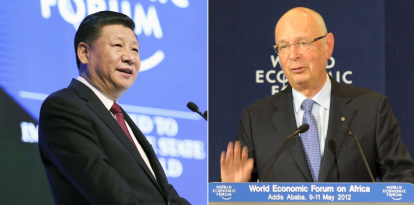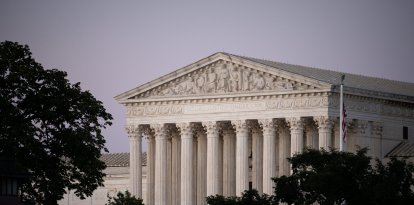Will Trump's 'America First' foreign policy help or hurt Israel?
The new administration won't be isolationist. But unlike its predecessor, it will be skeptical of the United Nations, European opinion and a blank check for Ukraine.

Israeli Prime Minister Benjamin Netanyahu and his wife with Donald Trump
The return of Donald Trump to the White House may send shivers down the spines of many, if not most, American Jews. Israelis, however, in large part seem relieved by the outcome of the 2024 presidential election. Both reactions are unsurprising.
To the majority of American Jews who are both politically liberal and loyal Democrats, Trump embodies contempt for the rule of credentialed elites—among whom most Jews number themselves—and the woke ideology they have imposed on the nation. Trump is the "bad orange man" around whom working-class voters of all races have rallied. Various exit polls differ on the degree of movement towards Trump, which was in evidence in some but not all sectors of American Jewry. But it’s clear that partisan loyalties overwhelmed concerns about the way left-wing Democrats have embraced antisemitism and hatred for Israel in the year since the massacre in southern Israel on Oct. 7, 2023.
Most Israelis see Trump solely through the prism of his undoubted record as the most pro-Israel president since the founding of the modern-day Jewish state. The positive memories of Trump moving the U.S. embassy from Tel Aviv to Jerusalem, recognition of Israeli sovereignty over the Golan Heights, holding the Palestinian Authority accountable for its support for terrorism and its pushing for the 2020 Abraham Accords peace agreements with Muslim and Arab states have only grown when compared to the equivocal attitude of President Joe Biden and his foreign-policy team during their four years in office.
"All foreign-policy choices are transactional, but every nation has the duty to consider the interests of its own people first."
A more pro-Israel president
Biden and the rest of his administration spent the last year since Oct. 7 speaking out of both sides of their mouths about Israel’s struggles. On the one hand, they sometimes expressed strong support for Israel’s right to self-defense as well as the eradication of Hamas, and never completely cut off the supplies of arms it needed to continue the war, even if they were slow-walked. At the same time, the drumbeat of criticism and unhelpful advice served to delay and hamper Israel’s efforts to defeat its enemies while giving hope to the Iranian-backed terrorists that the ceasefire for which Washington yearned would allow them to survive and defeat Israel.
Things will be different under Trump, who has repeatedly expressed his support for a green light to the Israelis to do everything in their power to quickly win the war. Though relations between the two allies will be dependent on Prime Minister Benjamin Netanyahu’s ability to manage his relationship with Trump (i.e., flatter him and never get on his wrong side) as well as the people the president names to fill important foreign-policy posts, both Israelis and their American friends are right to assume that, at worst, the ties between Washington and Jerusalem will almost certainly be warmer than they were during the past four years.
But even those Trump critics who acknowledge, as they must, that Trump’s record on Israel is largely exemplary are quick to assert that despite that, Israel will inevitably suffer from a revival of a Trumpian "America First" foreign policy.
Linking Israeli security to Ukraine
Their argument is that an isolationist American administration is bound to lose interest in Israel’s security. Moreover, they believe a policy that hinges on a transactional approach to foreign policy as well as a pronounced disinterest in entangling the United States in foreign wars—whether in the Middle East or the one between Russia and Ukraine—is a recipe for disaster for the Jewish state.
"America first" critics assume that only when Washington embraces a spirit of unbridled interventionism abroad can Israel be safe. They see all of the threats to both the United States and Israel as part of a broad axis of interconnected and dangerous malevolent powers.
In particular, they assert that there is no difference between Israel’s battles against its terrorist enemies and Ukraine’s efforts to resist Russian aggression. The basis of this assertion is that for the United States to hold back from full-fledged involvement in any conflict involving Russia, China or Iran would mean that any other commitment would necessarily be downgraded, if not entirely discarded.
"Trump's 'America First' is more of a realist policy than anything else."
In this way, they reason that Trump's obvious sympathy for Israel and disdain for its enemies (or even that of those in his inner circle) will eventually fall prey to an isolationist instinct that will cause his administration to backtrack on its commitments. They also assume that anything less than a total victory for Ukraine over Russia—a fanciful vision that they can neither define nor tell us how it will be achieved—will diminish Israel’s security.
All of this is demonstrably untrue. Russia, China and Iran may seemingly all be on the same side in both the conflict in Ukraine and the war against Israel in the Middle East. But Ukraine’s cause has nothing to do with that of Israel. Success for one does nothing to enhance the security of the other.
It is true that China, Russia and Iran seem to have formed a loose alliance. It is equally true that China’s global ambitions have set in motion events that may well, as historian Niall Ferguson argues, be considered a new cold war. But even if that is so, that doesn’t necessarily mean that all the proxy wars generated by this conflict, such as that between Russia and Ukraine, are crucial tests of American will.
Picking and choosing between proxy wars
Much like some of the "minor" proxy wars that arose during the first Cold War, such as the war in Vietnam, rather than obligating the United States to go all in, the outcome of the war in Ukraine may not have much to do with determining whether the United States or China ultimately prevail. The key to wise Cold War statesmanship was not a blind willingness to dive into every possible proxy conflict with the former Soviet Union. It lay in knowing the difference between those battles that demand American involvement and those that the United States would be far better off ignoring—or at least not involving itself in a win-or-die challenge.
In retrospect, the United States would have been far better off refusing to join the war in Vietnam. That is true not because involvement in that war was "morally wrong." Seeking to halt the spread of communism or even just refusing to allow South Vietnam to fall to its northern Soviet/Stalinist member state was, in fact, a deeply moral cause. The United States should have stayed out of the conflict because control of Vietnam was not a strategic imperative for America. To the contrary, American involvement in the war undermined U.S. security precisely because shedding so much blood and expending so much treasure on it was not justified by any potential benefits that defeating the Communist north might give the United States.
Despite the sympathy that most Americans have for Ukraine’s fight for its independence, the same can be said about American involvement in that conflict. The ultimate disposition of Crimea and Eastern Ukraine, which were first taken away from Ukraine in 2014, is not an American strategic concern. And now that the fighting has demonstrated that Moscow can’t conquer Kyiv outright any more than the Ukrainians can topple Putin’s authoritarian Russian regime, it’s simply immoral for Washington to be funding a war that can’t be won or concluded on any terms but those requiring both sides to make painful compromises.
The stakes involved in Israel’s war against Iran and its proxies are very different. The notion that Ukraine is a valiant democracy fighting for the freedom of the world is a myth. The regime of Ukrainian President Volodymyr Zelenskyy is not as democratic or free from that nation’s antisemitic past as the foreign-policy establishment claims. By contrast, helping Israel defeat these terrorists who seek to spread chaos and genocide in a region central to American interests because of its oil reserves and strategic placement is vital to U.S. security.
All foreign-policy choices are transactional, but every nation has the duty to consider the interests of its own people first.
The choice of "America First" for the title of Trump's foreign-policy vision has always been unfortunate since it conjures up the pre-World War II movement led by Charles Lindbergh that was both dedicated to appeasing Nazi Germany and antisemitic. Trump's "America First" is neither dedicated to appeasing a foreign foe or spreading Jew-hatred. It is, instead, more of a realist policy than anything else. That's because it involves, as we saw in Trump's first term, a desire to defeat the Islamist terrorists of ISIS, in addition to an aggressive policy of sanctions and anti-terror special operations against Iran.
There is a difference between having the good judgment to pick and choose your battles based on American interests and a policy of isolationism. The notion that an America not willing to commit itself to conflicts anywhere no matter the circumstances will betray Israel is absurd as well as impractical. And it has yet to be explained how Israel is helped by a situation in which American strategic reserves are drawn down to the breaking point to fund and supply an endless war in Ukraine, rather than expended sparingly until they are needed for more important conflicts. Israel needs a strong American ally, not one mired in a conflict that only saps its strength.
"Though many anti-Trumpers falsely accuse Trump of antisemitism, the opposite is true."
Trump’s version of "America First" has other tangible benefits for Israel. Unlike both Obama and Biden, Trump is not interested in bolstering multilateral organizations like the United Nations that are cesspools of antisemitism and irredeemably hostile to the Jewish state. The president-elect has little use for that world body or any of its constituent agencies that do so much to demonize and harm Israel.
And though Biden bragged about how European leaders were thrilled with the return of the Democrats to power in January 2021, Trump is right to regard their good opinion as having no value. The less connected the United States is to international opinion, and especially that of the governments of Western Europe, the better it is for an Israel that Western Europe has already largely written off.
Some observers are so deranged by Trump’s ascendance that they fail to recognize that defending the interests of U.S. citizens "first" is both moral and a wise policy. Though many anti-Trumpers falsely accuse Trump of antisemitism, the opposite is true since he did more to combat Jew-hatred on campuses than his predecessors, who saw the antisemitic mobs as demonstrating idealism that must be heard, if not fully accepted.
While events and changing circumstances can’t be accounted for when determining the future, Trump’s pro-Israel record and opposition to woke ideology represent a harbinger of smoother sailing for the alliance between the two countries in the next four years. Whether successful or not, "America First" is likely to be a better American foreign policy for Jerusalem than the efforts of Biden and Harris.
© JNS
RECOMMENDATION























